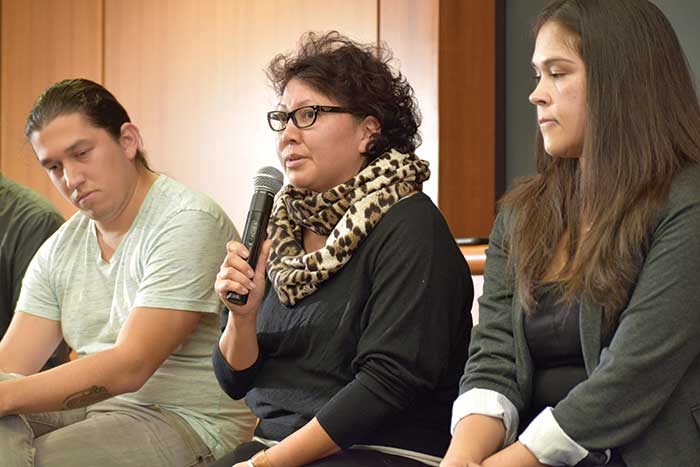Same place, different histories
By Cara McKenna
Tsleil-Waututh people know a much different history of Vancouver than the city’s non-Indigenous residents, with a connection to the land that has existed since time immemorial.
Charlene Aleck recalls hearing stories about people from her nation who once hunted along what is now known as Robson Street.
“Grandfathers used to hunt elk and bring our clams over and we would be stringing them up and selling them at the docks,” she said.
It’s a story that garnered awe from dozens of people who gathered at Simon Fraser University’s downtown campus for a panel discussion on Coast Salish protocol on Nov. 2. Most only knew Robson Street as a busy shopping mecca.
Aleck said she appreciates the interest and acknowledged that settlers haven’t always been interested in the city’s Indigenous history as they are today.
“There was a time when we couldn’t speak our language, we couldn’t sing our songs,” she said. “This is one [time] where we’re unpacking a lot of things and our ancestors on both sides are coming to deal with.”
Speakers on the the panel, which also included people of the Musqueam and Squamish nations, talked about how they are dealing with a growing interest in respecting Coast Salish protocols.
At the discussion, non-Indigenous people from various organizations asked questions about how to incorporate Coast Salish protocols and reconciliation work into their meetings or events.
Panelists said that acknowledging Indigenous territories is crucial, but organizations should also be thinking of ways to go beyond that; for example, by hiring local Indigenous people for events or actively changing outdated policies to make room for reconciliation work.
Khelsilem from Squamish Nation said it’s important to think about the give-and-take of power when incorporating Coast Salish protocol into events. For example, a small meeting likely would not require a representative from one of the three nations, but a larger event with more impact might.
“All of our leadership, our people, we’re all trying to make our communities better,” he said. “It’s [about] trying to restore power to the original people that are from here and have had their power suppressed, or dispossessed, or taken away or fought.”
Irwin Oostindie, a graduate student at SFU who studies settler cultural policy and redress, said it is crucial work that must be taken seriously in modern times.
“Maybe think about what our organizations are not doing, or what they are doing, and name that at the beginning of the meeting,” he suggested. “If we did that every month at every meeting for two years, we actually would track some substantive changes.”




